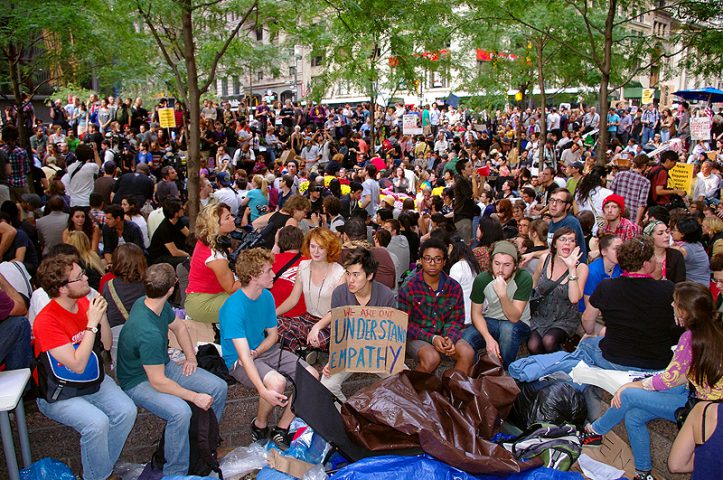It took me a long time to get my head around the Occupy Wall Street protests—but I fully support the idea that this country needs change and we need it sooner than later. I’m not sure if anyone could have foreseen the Occupation becoming the national movement that it has, but the activists’ perseverance sends the message that we, the people, are not going to back down. This view was supported by a friend of mine who suggested that there is no change without a movement, and this is our generation’s big moment.
“Our generation?” I was intrigued. When I think about previous national movements for change, I think of struggles for civil rights, women’s liberation and gay equality. Occupy Wall Street, if we allow it to become the movement of “our time,” seems quite different from its predecessors: the movements of the 1960s and 1970s were germinated by oppressed minorities, but Occupy Wall Street is a movement on behalf of the majority, and not exclusive to any minority. Perhaps for the first time, LGBT activists have blended in to the overall coalition for progressive change, and the cause for LGBT equality is seen as implicit in the movement. The LGBT platform is so understood as an essential component of the struggle that no one is really talking about it.
“I think the coolest thing right now is that queer people are being seen as just part of the fight,” Justin Adkins, a transgender man from Massachusetts, told the Advocate. “The majority of the time when I’m protesting, I’m either queer, or I’m for this. It’s not usually that I can be both. I’m a queer person fighting for economic justice. How awesome is that?” Pretty awesome, I say.
That’s not to say that fundamentally discriminatory problems within our society have ceased to exist. As musician J.D. Samson put it in a Huffington Post blog post, “I will always be a queer woman, a woman who makes 77 cents to the man’s dollar, and a queer who makes 23 percent less than the heterosexual. Does that mean that I make 54 cents to the straight male dollar?” Economic inequality could have been partially solved with the passage of the Equal Rights Amendment, a major piece of legislation championed by women’s groups in the 1970s that failed to become law. Clearly, social and economic injustice would still be problematic even if there was to be a change in our country’s financial policies. The Occupy Wall Street activists are trying to address both issues.
There are many kinks to be worked out, but I believe the Occupy Wall Street protests are the start of something big. Hopefully, the grassroots organization represents the next direction for our country’s politics. Thanks to the activists who came before us, our generation is less concerned with gender, sexuality and race discrimination and more interested in major political change, inclusive of everyone who wants to join the fight.


What Do You Think?